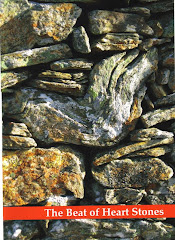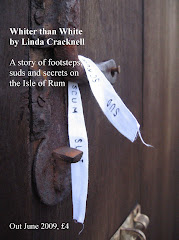I always learn something from listening to writers talk. A startling new gem of wisdom, a reinforcement of my existing assumptions, or the articulation of something I half know and half don't know (perhaps the best of all). That's what makes a few days at the Edinburgh International Book Festival such a treat. My stars this time were the single author events where there was time for in-depth insights.
Anne Enwright read a story, Until The Girl Died from her new collection, Taking Pictures. It was a brilliant story and an actorly reading, full of humour and pain - a combination I envy and rarely attempt. She spoke of the 'deep creak', the resonance in her ironic humour - the perfect description. But I was also gratified to hear her say that she wrote the same story over and over, but because the content differs each time, her readers don't notice. My own intuitive writing hand has often tricked me in this way. Just as I think I'm writing a new story, in creeps a hot decision or change of plan, perhaps as I near the end of the first draft, that feels right, so right. Only then do I realise it's changed the story - made it about loss. Again.
Hanif Kureishi made me laugh a lot. Dead-pan, anarchic, he spoke about his new novel about a psycho-analyst, Something to tell You. He also spoke of his university teaching, comparing creative writing courses to mental hospitals, where people are to be encouraged in their madness, to be comfortable with it, to break the rules.
The point in each session where the questioning is opened to the audience is always a worrying one - will the questions be coherent, useful, fresh? The first question directed at A L Kennedy after she read a new, longish short story struck horror in my heart - what if I should get something similar? 'What aren't you married?' came the sweet voice from the audience. But rather than being affronted by the personal intrusion, or thrown by it, A L Kennedy gave a sad but thoughtful response about her position as a women writer who spends only 50% of her time at home, only 50% of her time in Britain; who works alone, is selfish with her time and needs a man who can be like a wife, prepared to indulge and nurture. Situation vacant.
She also spoke about teaching writing - how finding one's writerly voice can't be taught in a workshop, but has to be discovered; how fear has to be overcome in order to write. She quoted Mandela: 'It's not our inadequacy we fear. It's our power'.
I enjoyed my own session with Angus Dunn and Edinburgh Makar, Ron Butlin on Sunday evening. We had a good audience, including a substantial contingent from the British Council's international 'Bookcase' programme. Mercifully questions from the audience were about writing in the second person 'you', the merits of your work being used in a government educational programme, rather than about marital status.
Subscribe to:
Post Comments (Atom)




No comments:
Post a Comment